Category: Health
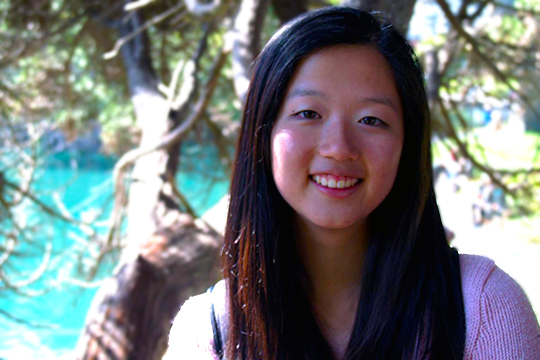
Wherever I was needed most
By Angela Li, ’17 (Biomedical Computation)
I first met Yvette* when I was assigned to be her interpreter during a routine appointment, and we talked for over an hour on our way out of the clinic. She opened up to me about her struggles with depression, and I listened as she shared her story: crippling loneliness as a recent immigrant, financial woes, an absent husband. We also connected over our shared love of Oaxaca, Mexico, her hometown, and at the end of our conversation, she was in better spirits, even a bit hopeful. As she thanked me profusely, I was delighted to see her genuinely smile for the first time that day.
As a Community Health Advocacy Fellow, I have had the privilege of getting to know people like Yvette while volunteering at MayView, a community health center that serves local low-income patients. During weekly shifts, I would help wherever I was needed most: as an interpreter, doing intake and vitals, or even comforting children as they were getting their blood drawn. In addition, I helped develop an online patient portal and customize it to the needs of MayView patients. This entailed not only applying the community health principles I had learned in the classroom, but also working with individual patients, teaching them how to use this tool and empowering them to proactively manage their health.
I look forward to caring and advocating for underserved patients in the future as a physician.
*Not her real name
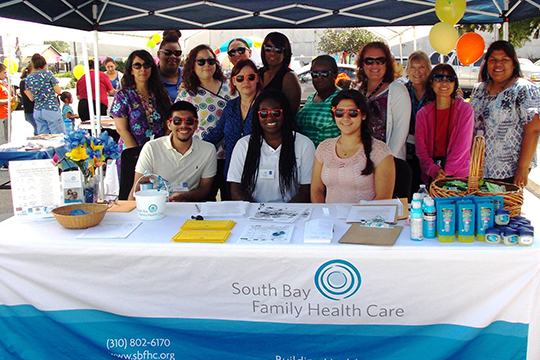
Health resources for families in need
By Miguel Ceniceros, ’19 (Human Biology)
As a woman got her blood pressure checked, her young daughter ran up to my table and smiled wide as she pointed at one of the coveted balloons we were handing out at South Bay Family Healthcare’s National Health Center Week Health Fair. I handed her one, and she ran to the next table to learn about the importance of brushing her teeth.
In the summer of 2016, I had the opportunity to volunteer with South Bay Family Health Center, engaging with community members and health providers. I learned about inequities in women’s and children’s health, and the efforts of health providers to bridge these gaps.
To say that South Bay Family Healthcare is just a health center is an egregious understatement. This organization, with its wonderful and dedicated staff, provides relief and resources to hundreds of families who would otherwise have little or no healthcare available to them. The caring staff taught about the value of teamwork, and the importance of advocating for those who need and ask for help. I am honored to have worked with an organization dedicated to the health and well being of the community.
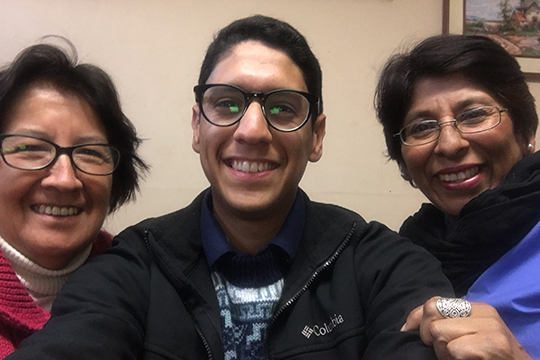
Research + community engagement
By Christopher Rodriguez, ’17 (Human Biology)
Pale wisps of steam flutter and twirl above the cup of tea on the table before me. The living room is narrow; the floor is rough, faded; the chairs feel like boulders. Sunlight scarcely saunters in through the window.
Beside me, Lilia Perez speaks in a soft cadence. She is the director of a branch of Samusocial Peru located in the secluded district of Ate-Vitarte, and my community partner. Lilia comforts a woman who holds back tears. She reminds me that most of these women are not normally granted the opportunity to disclose their abuse experiences.
This past summer, my goal was to better understand the resources that survivors of violence against women in suburban Peru find most useful to facilitating their social reintegration. The Public Service Scholars Program at Stanford has offered me the avenue through which to intersect scholarly research with community engagement.
Interviewing survivors of interpersonal violence was not easy. When they were not hesitant to share their stories, they delivered years of silent suffering in a flurry of crackling words. But as painful as it was to hear these stories, I do not forget how meaningful this research is.
The Public Service Scholars Program is a year-round program that supports students’ efforts to write a thesis that is academically rigorous as well as informed by and useful to specific community organizations or public interest constituencies.
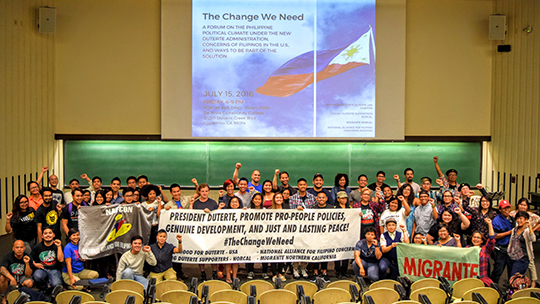
Becoming part of the neighborhood
By Ian Macato, ’19 (Symbolic Systems)
The Filipino Community Center in the Excelsior neighborhood of San Francisco serves to provide a safe space where Filipino families can access services, meet, and hold activities. The Excelsior neighborhood has the second highest population of Filipino/a people in San Francisco, and they are mostly low-income, working class immigrants. As true community members, we organize with partner grassroots organizations striving to fix the root causes of unemployment, unaffordable housing, and poverty in the neighborhood and in the Philippines. The center’s purpose is ordinary, helping community members to access government services and benefits. But serving as an intern at the FCC means to become a part of the Excelsior neighborhood and immerse oneself in the stories, experiences, and lives of the community members we serve. Through learning how to serve our kababayans (the Tagalog word for fellow compatriots), by helping them to get their much deserved government benefits, we also become their friends, counselors, and community members. We take part in their story and empathize with their struggle, knowing ours is interconnected.
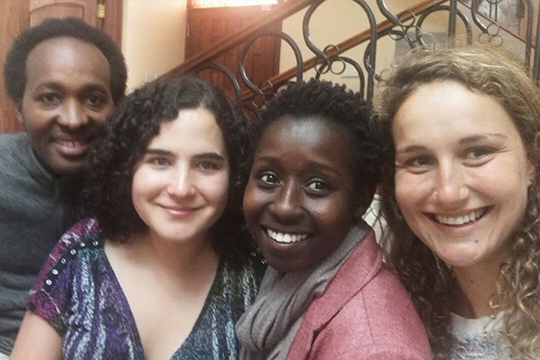
Research rooted in public service
by Ashley Jowell, ’17 (Human Biology) and Sharon Wulfovich, ’17 (Human Biology)
The sun was setting upon Arusha, Tanzania, as we joined together for an evening discussion. We, along with our translator, Jenipher, and project manager, Sianga, enjoyed our home cooked meal in celebration of completing our 16th interview. Our faces were glowing as we sipped our tea, finished our last bites of mchicha, and discussed the data we collected as well as its potential impact. The stories Maasai women shared had been informative, alarming, and inspiring as they described the impact that moving to Arusha from their village had on their lives. How, we discussed, might we use this research to benefit the women facing such hardships upon migrating? This was a conversation we would continue to grapple with throughout our entire project and on-campus conversations.
Our research, designed in collaboration with The Future Warriors Project, a Maasai-run NGO created by Sianga, involved interviewing female Maasai migrants who had moved to Arusha. While both researchers were looking at the impact of this journey on their health, Sharon’s project focused on health decision making behavior and Ashley’s focused on resilience and identity. As the four of us bounced ideas, we felt honored to conduct research that strove to benefit the community we were so privileged to serve.
Ashley is a member of the Public Service Scholars Program at the Haas Center, where she has continued engaging in discussions on scholarship & ethical service.
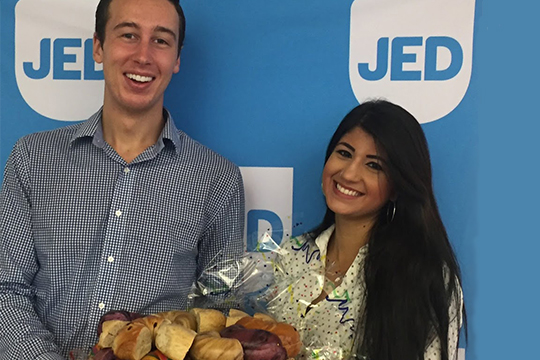
Community building amid high-stakes work
By Carter Osborne, ’17 (Political Science)
If you’ve never tried a New York bagel, you’re really missing out. I never could have foreseen my obsession with these rings of boiled bread, but there I was this summer, so enamored with them that I persuaded my coworkers to join me in a new lunchtime office tradition: bagel Tuesday. It was probably a bit goofy for an office setting, but such was the extent to which I felt at home with the phenomenal employees of the Jed Foundation (JED). I fit right in with the staff, and through 10 weeks of work with them, I got to observe and briefly experience both the fun and emotional challenge of their jobs.
JED is a Manhattan-based nonprofit that works to reduce rates of suicide and substance abuse among young adults. Through the Urban Summer Fellowship, I got to spend every day this summer immersed in powerful conversations concerning the emotionally weighty topic of suicide. And while my projects were sometimes emotionally difficult to complete, their potential impact on college students across the country always inspired the motivation required to keep pushing further. And of course, the endless positive energy in the office taught me how to balance my work with a fun lifestyle. My time with JED was challenging and hilarious and, at times, heart-wrenching, but I can honestly say that with everything considered, I wouldn’t trade my summer with JED for all the bagels in Manhattan.
Carter is a 2016-17 fellowships peer advisor.
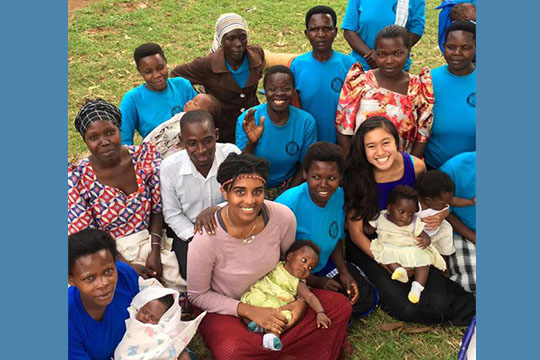
Lessons from Uganda
By Vivian Ho, ’17 (Human Biology)
The drums reverberate in the red dust. The women in the community groups sing to the beat of the drums with a rumble in their voices—a rumble that declares a sense of community, a rumble that states they are effecting change for the issues that matter to them. They are performing dramas about pregnancy, nutrition, and hygiene. The crowd, with over 500 people, is listening.
With the support of a Halper fellowship through the Haas Center for Public Service, I worked with Safe Mothers, Safe Babies (SAFE), a nonprofit organization aimed at reducing maternal mortality rates in eastern Uganda. My time in Uganda challenged my norms and made me evaluate new ones. It forced me to recognize how activism and seeking justice can be loving to the populations who desire to be heard, especially women. It gave me personal stories and examples of frameworks to life that are different from my own, and yet somehow they are not so different. It has given me an itch to recognize the status quo and not be settled in it.
When I left the U.S., I expected simply to do a public health internship in Uganda. By the end of my time there, I realized I had found a family. In the words of a village member, “You have roots here in Uganda. You’re a Musoga.”
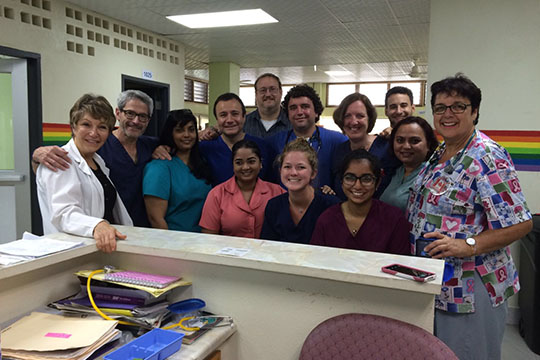
He’s tumor free
By Riasoya Jodah, ’19 (Undeclared)
Three days after my fellowship ended, I got a text message from my former co-workers in our group chat that I couldn’t bring myself to leave just yet. It was a picture of a smiling boy swaddled in blankets with tubes resting beneath his nose. The caption read “He’s tumor free.”
Shawn is an eight year old indigenous boy who was admitted to pediatric surgical ward of the Georgetown Public Hospital Cooperation the day I started my Halper International Fellowship in Georgetown, Guyana. He came in with a near lethal snake bite, but my team also found a mass that turned out to be a Wilm’s Tumor in his kidney. Shawn, like many other patients that I worked with, lives in a remote village and arrived via medivac to the hospital. It’s quite possible that his tumor would have remained undiscovered if he hadn’t been forced to seek care due to the snake bite.
His struggle is familiar to the thousands of indigenous people without access to health care in Guyana. After a grueling 10 weeks of biopsies and treatments, Shawn underwent surgery where the tumor was entirely removed. He’s back home now; a healthy boy with his family. I receive an updated picture whenever he visits the hospital for a follow-up, and it serves as a reminder of the service I owe to the people of my home.
Ria is a 2016-17 fellowships peer advisor.
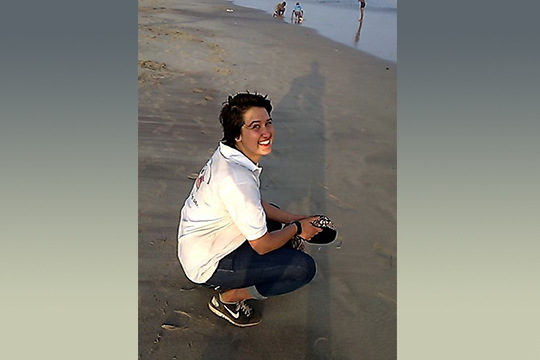
Unfinished business

By Mina Shah, ’16 (Comparative Literature)
When I received an African Service Fellowship to work with the West Africa AIDS Foundation (WAAF), I was ecstatic. However, while preparing for the fellowship I began to study ethical theory relating to serving in communities with which the server is unfamiliar. I became terrified that by engaging in this service endeavor, I’d be doing a morally reprehensible thing. Furthermore, a week before I left, my grandmother passed away, sending me spiraling into grief for the entire time I was working at WAAF. Then, just as I felt like I was getting adjusted to my surroundings, Stanford pulled out all students in West Africa due to the Ebola outbreak.
The combination of wanting to conduct my service with WAAF as ethically as possible and feeling as though I’d left unfinished business in Accra made me want more than anything to go back to Ghana and WAAF this past summer. Using the entire academic year to prep, I was better able to serve the organization as a more respectful outsider. As a result, I became motivated to apply for the Master’s Program in African Studies here. So, cliché as it sounds, this experience has changed my life positively in ways that I never could have anticipated.
Mina is a 2016-17 fellowships peer advisor.
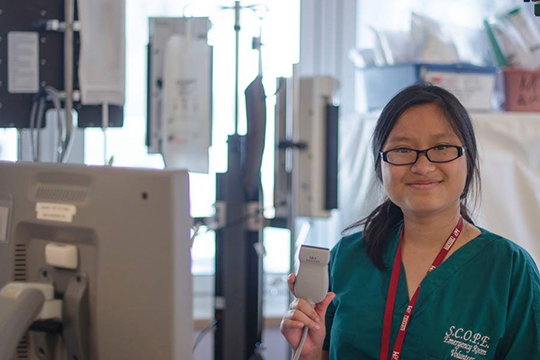
Bridging the gap between patient and provider
By Van Tran, ’16 (English)
Not many people can say they’ve had the chance to meet a survivor of human trafficking and domestic violence. I still remember the day the paramedics brought Quy* into the emergency room. Her head was tender from where it been bashed, the skin around one eye an angry red that slowly bruised purple. But what I remember most is the blank look in her eyes as the staff at Santa Clara Valley Medical Center (SCVMC) tried to figure out what language she spoke.
Our hospital doesn’t have in-house interpreters on weekend or overnight shifts. That’s where I come in as a volunteer interpreter from SCOPE, a hospital nonprofit that connects Stanford students with opportunities for public service. On some days, I’m the only Vietnamese speaker in the emergency department. By bridging linguistic and cultural barriers, I facilitate healthcare delivery for patients like Quy.
In my three years with SCOPE, I have been blessed with the opportunity to share in the experience of SCVMC patients, many of whom come from underserved communities. In the process of working with these patients to convey their story, I discover new facets of my cultural heritage and emerge reinvigorated in my dedication to public service.
*Alias used to protect patient’s privacy.
